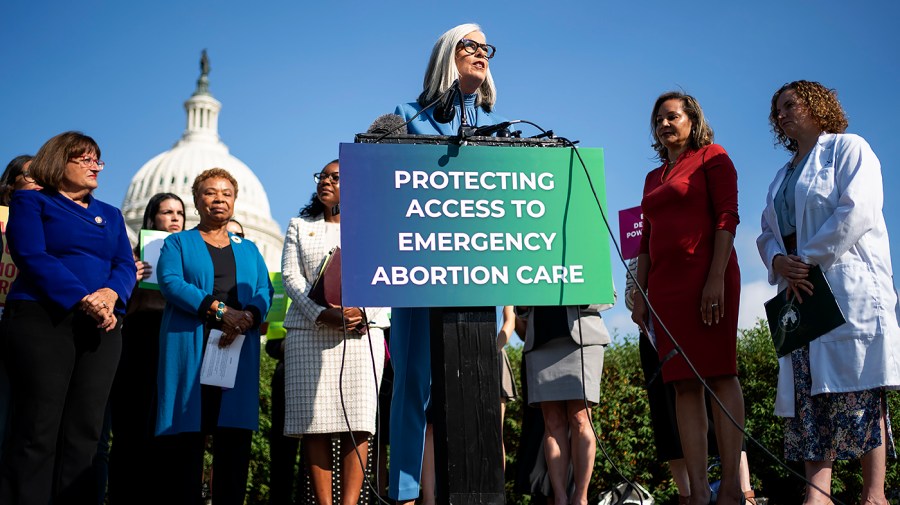
If you want fewer women and girls to die because of pregnancy complications, it’s important to elect lawmakers to Congress who care about that, too. Because the Supreme Court does not appear to be coming to the rescue.
Last week, the court left in place a lower federal court ruling in Texas that bans the Department of Health and Human Services from enforcing a federal health care law. The Emergency Medical Treatment and Labor Act (EMTALA) requires hospitals that receive Medicare funding to provide whatever treatment is necessary to stabilize patients with emergency conditions that seriously threaten their lives or health — including care that could terminate a pregnancy.
The Texas case is one of several making their way through the federal courts that pit the federal EMTALA law against competing draconian state abortion laws. Since the high court overruled Roe v. Wade, 14 states have enacted near-total bans on abortions.
In Texas, doctors who perform abortions can be criminally prosecuted and face life in prison unless prosecutors agree with the medical judgment that a particular patient had “a life-threatening condition” and was “at risk of death or ‘substantial impairment of a major bodily function’ when an abortion was performed.” The law contains no exceptions for rape or incest, or for fetuses with severe abnormalities.
The law does not define “substantial impairment of a major bodily function.” But in June the Texas Medical Board issued revised guidance stating that an ectopic pregnancy — in which the fertilized egg implants in a fallopian tube, guaranteeing rupture and threatening the life of the mother — is not an abortion after a hospital in Central Texas denied treatment to a woman with an ectopic pregnancy, citing fear of criminal prosecution. The guidance also clarifies that the threat to a woman’s life does not need to be “immediate” to justify an abortion.
But as Dr. Todd Ivy, a Houston obstetrician, remarked, the guidance doesn’t preclude criminal prosecutions.
“Do I feel more protected as a physician who may find myself in that position? No. I don’t,” he said. I think the severity of the penalties will always be a deterrent.” This means that pregnant patients won’t get the full panoply of life-saving care available so long as criminal penalties loom for doctors.
The abortion battle has thus shifted to whether pregnant women and girls have a legal right to life-saving health care that is equal to what everyone else in America is entitled to. In passing EMTALA, Congress already made clear that the answer is yes — emergency care does not discriminate in America. Yet the far-right majority on the Supreme Court could say no, which means that voters will have to look to Congress to spell out that life-saving medical care is still life-saving medical care, even if it affects a pregnancy.
The court appears likely to say no because it refused to temporarily intervene in the Texas case on the side of federal law, despite the plain language of the Supremacy Clause in Article VI of the Constitution, which states that federal law is “the supreme Law of the Land,” even if state law says something to the contrary.
In Texas, the abortion ban only allows for exceptions if the failure to terminate a pregnancy would be “life-threatening” or cause “substantial impairment of a major bodily function.” EMTALA states, by contrast, that when “any individual…comes to a [Medicare-participating] hospital” with an “emergency medical condition,” the hospital must offer such treatment “as may be required to stabilize the medical condition.” As Justice Elena Kagan explained in a case last term involving a clash between EMTALA and Idaho’s ban on abortion unless “necessary to prevent” a woman’s “death,” in many situations, “federal law requires the hospital to offer an abortion, whereas Idaho law prohibits the emergency care.” (The court dismissed that case on technical grounds.)
In the case of a conflict between federal and state law, the Constitution is clear: Federal law wins. Although Texas (unlike Idaho) includes an exception for life-threatening conditions, the particulars of an abortion ban’s exceptions are beside the point, as Dr. Ivy explained. The specter of severe criminal penalties chills physicians’ ability to utilize the Texas exception because the government could later disagree with their medical judgment and prosecute them.
If the Supreme Court’s “textualists” applied the plain text of the Supremacy Clause to make clear that EMTALA is the supreme law of the land when it comes to physicians’ obligation to provide life-saving and calamity-avoiding medical care to pregnant women, physicians could breathe easier knowing their medical judgment will stand. Women, too, would be able to rest assured that getting pregnant — including by rape or incest — won’t amount to a government-mandated death sentence if they need to see a doctor over complications.
Polls suggest that the Senate could fall into Republican hands next month, which would all but guarantee that the majorities of Americans who want abortion protections won’t get them in the next Congress. They probably won’t even get an amendment to EMTALA to make clear that it means what it already says — pregnant women are entitled to critical care, too.
When the Supreme Court finally weighs in on this issue, it could rule that Congress will need to act in order to save lives. Congress should clarify EMTALA to state that medical care that could result in pregnancy termination qualifies as “treatment” that the law mandates to stabilize an “emergency medical condition.” Anything less could give the far-right justices wiggle room to impose their ideological will on the American people yet again.
Kimberly Wehle is author of the new book “Pardon Power: How the Pardon System Works — and Why.”

